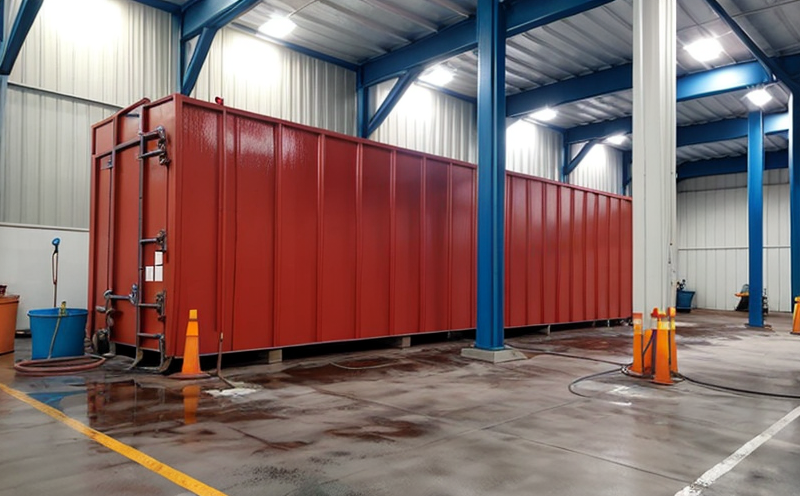JIS G0579 Electrochemical Corrosion Testing of Coated Steels
The JIS G0579 standard is a pivotal method used in industrial manufacturing and processing testing for assessing the corrosion resistance of coated steels. This electrochemical technique evaluates the protective performance of coatings applied to steel substrates, ensuring that these materials meet stringent quality standards before being utilized in demanding environments.
Coatings are critical in protecting metals from environmental factors such as moisture, chemicals, and mechanical abrasion. In industries like construction, marine, automotive, and aerospace, the integrity and longevity of coated steels can significantly impact operational efficiency, safety, and compliance with regulatory requirements. The JIS G0579 test is particularly important for ensuring that coatings provide adequate protection against corrosion, which is a major concern in these sectors.
The testing procedure involves immersing steel specimens with various types of coatings into an electrolyte solution. An impressed current or natural current is then applied to simulate real-world conditions under which the coated steels will operate. The test measures the rate of mass loss and changes in electrical resistance over time, providing quantitative data on the effectiveness of the coating.
During specimen preparation, it's crucial to ensure that the steel substrate is clean and free from contaminants. Any imperfections or residues can affect the accuracy of the electrochemical measurements. The testing apparatus used includes precision current sources, potentiostats, and multi-channel data acquisition systems to monitor various parameters simultaneously.
The results of JIS G0579 tests are typically reported in terms of the weight loss per unit area over a given time period or changes in corrosion potential. These metrics help manufacturers and quality control personnel make informed decisions about the suitability of coatings for specific applications. By adhering to this standard, companies can enhance their product reliability and comply with international specifications.
Understanding the nuances of JIS G0579 testing is essential for those involved in industrial manufacturing and processing, particularly when dealing with coated steels. This method ensures that materials used in critical sectors are robust enough to withstand harsh conditions without compromising safety or performance. Implementing this standard can lead to significant improvements in product longevity and overall quality control.
Applied Standards
The JIS G0579 electrochemical corrosion testing of coated steels is based on the Japanese Industrial Standard (JIS) specifications, which are widely recognized for their rigorous technical requirements. This standard aligns with other global standards such as ASTM D6117 and ISO 4623, providing a harmonized approach to evaluating coating performance.
- JIS G0579: Electrochemical Corrosion Testing of Coated Steels
- ASTM D6117: Practice for Conducting Potentiostatic Cathodic Protection Efficiency Tests on Anode-Cathode Systems in Soil and Water
- ISO 4623: Metallic Coatings—Cathodic Protection of Metal Surfaces by Sacrificial Anodes
These standards provide a consistent framework for testing, ensuring that results are comparable across different laboratories. Compliance with these standards is crucial for industries relying on coated steel products to ensure reliability and safety.
Industry Applications
The JIS G0579 test finds extensive application in the industrial manufacturing sector, particularly within industries that demand high levels of protection against corrosion. Construction firms use this method to evaluate coatings on structural steel components exposed to outdoor environments. In the automotive industry, it is used for assessing protective layers applied to vehicle body panels.
The marine sector benefits greatly from JIS G0579 testing, as ships and offshore structures are frequently subjected to corrosive seawater. Aerospace companies also utilize this technique to ensure that coatings on aircraft parts meet stringent durability standards. Additionally, oil & gas exploration firms apply it to inspect the integrity of pipelines and storage tanks.
For quality managers and compliance officers, JIS G0579 testing is indispensable for validating product specifications and meeting regulatory requirements. R&D engineers can rely on this method to optimize coating formulations and improve material performance. Procurement teams use these results to select suppliers delivering the highest-quality materials.
Environmental and Sustainability Contributions
JIS G0579 testing plays a significant role in promoting environmental sustainability by ensuring that coated steels are resistant to corrosion without compromising on performance. By adhering to this standard, industries can minimize the need for frequent maintenance and replacements of corroded materials, thereby reducing waste generation.
- Reduced Material Waste: Coatings that pass JIS G0579 tests last longer, leading to lower replacement rates and reduced environmental impact.
- Energy Efficiency: Corrosion-resistant coatings help in maintaining the structural integrity of industrial assets, which can lead to more efficient operation and less energy consumption over time.
- Resource Conservation: By extending the lifecycle of coated steel products, industries can conserve natural resources used in manufacturing new components.
The implementation of JIS G0579 testing supports sustainable practices by fostering innovation in coating technologies that enhance both environmental protection and operational efficiency. This aligns with broader sustainability goals across various industrial sectors.





